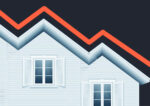The increasingly bewildering mortgage market is turning out to be an opportunity for agents.
Lenders have responded differently to rising rates and economic uncertainty, with some no longer matching competitors’ rates. The result has been a confusing variety of home loan offerings.
That can allow brokers who understand them to pull in more business by helping buyers navigate the process, which has grown even more intimidating in recent months.
“Everyone thinks they know everything based on the internet,” said Compass broker Mat Gundell. “But when you know the nuances of the mortgage process, and banks and lending, and you’re attuned with what’s going on … it’s a valuable sales technique.”
When the home-selling market was on fire, lenders routinely matched each other’s offers. Now that it’s slowing, rates differ dramatically by institution, making buyers more reliant on brokers.
“When everything’s stable, everybody wants everything,” said William Krooss-Tadas, a broker with Keller Williams, about lenders competing for borrowers. “There was really never a time where if you were banking with Chase or Wells Fargo that you couldn’t go to a competing bank and say, ‘Listen, they offered me a rate that’s significantly lower,’ and they would say ‘wait.’”
Wells Fargo and First Republic appear to be offering the most aggressive rates for 30-year fixed mortgages. Citi’s rate was an even 7 percent, according to its website, and Bank of America and Chase were both offering 5.625 percent on Oct. 18, compared to 5.125 percent at Wells Fargo, according to SmartAsset.
First Republic’s Eagle Community Home Loan program has caught some brokers’ attention by offering rates below 4 percent in parts of New York City that brokers anecdotally describe as recently gentrified or still gentrifying, such as Harlem and Bedford-Stuyvesant.
“I think it’s very promising. It was literally introduced to me about a week ago,” said Dennis Laronga, a Compass broker. “Banks are clearly aware of what’s going on, so I think they’ve kind of slowed down a bit, even what First Republic is offering … They kind of implied [the Eagle program’s rate] will go up.”
Read more

That seems a likely scenario if rates continue to rise, which has been hinted at by experts including Lawrence Yun, chief economist at the National Association of Realtors. Yun predicted last week that mortgage rates are likely to rise close to 8.5 percent, based on an analysis of resistance, or levels on a chart that can cause an index or rate to stall or reverse.
Mortgage rates have more than doubled over the past year, hitting a 14-year high in the wake of actions by the Federal Reserve to curb inflation. Interest rate hikes historically — but don’t always — trigger higher mortgage rates.
“Margins are razor thin and banks are … certainly not going to lose money to bring a loan in the door,” said Melissa Cohn, a senior executive at William-Raveis Mortgage. “It was a very different story just a few months ago.”
